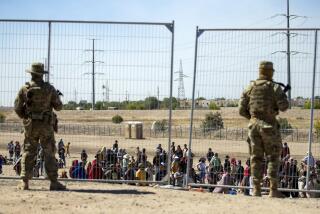Lawmakers cite Boston bombings in questions on immigration bill
- Share via
WASHINGTON — On the third day of hearings on a bill to overhaul the immigration system, senators took a break from partisan sniping and grilled Homeland Security Secretary Janet Napolitano on whether the Boston bombings had exposed shortcomings in the nation’s immigration security apparatus.
Conservative Republicans have tried to slow the Senate bill since two brothers, ethnic Chechens granted political asylum from Russia as minors with their family, were identified as the suspects in last week’s bombings.
But on Tuesday, other Republicans, as well as Democrats, bore into the details of exit visas and asylum requests as they examined the family’s immigration circumstances within the context of the proposed immigration bill.
The chairman of the Senate Judiciary Committee, Sen. Patrick J. Leahy (D-Vt.), asked whether the legislation would “help or hinder” security screenings of refugees.
Sen. Dianne Feinstein (D-Calif.) wanted to know whether the bill would “truncate” the asylum process.
And Sen. John Cornyn (R-Texas) noted that federal law had required an automated system to track arrivals and departures since 1996. “What gives you any confidence that it will be done now, under the terms in this bill, if it hadn’t been done over the last 16 years?” he asked.
The 844-page bill provides a complex series of political trade-offs that have drawn more scrutiny after the Boston Marathon attacks, which killed three people and injured more than 200 others.
An estimated 11 million people who came to the United States illegally or overstayed their visas would be eligible for citizenship after 13 years, once they paid taxes, fees and a $2,000 fine. New guest-worker programs would allow in more foreign workers, and employers would be required to verify the legal status of employees. The southwestern border would be bolstered with a double-layer fence, surveillance drones and more law enforcement personnel.
Senators were troubled that the FBI was not aware that Tamerlan Tsarnaev, the older of the brothers suspected in the Boston bombings, had visited Russia for six months in 2012. A year earlier, FBI agents had investigated and interviewed him at the request of the Russian government, which had identified him as a “follower of radical Islam and a strong believer” and indicated that he planned “to join unspecified underground groups,” according to law enforcement sources.
His name was misspelled on a manifest for the Russian airline Aeroflot, and the FBI, which had an active alert on him at the time, was not notified that he had left the country, according to law enforcement sources.
Napolitano acknowledged the “mismatch,” but said, “Even with the misspelling, under our current system, there are redundancies. And so the system did ping when he was leaving the United States.”
But she did not explain what this meant, telling lawmakers that she would elaborate in a classified briefing.
Under the immigration bill, she said, the mistake would not have mattered. “The bill will help with this because it requires that passports be electronically readable as opposed to having to be manually input,” she said. “It really does a good job of getting human error, to the extent it exists, out of the process.”
The 26-year-old Tsarnaev, who was a legal resident, died last week in a gun battle with police. His brother, Dzhokhar Tsarnaev, 19, who became a U.S. citizen on Sept. 11, 2012, remains hospitalized.
The legislation would beef up the exit systems for airports and seaports, but less so for land borders.
Senators also wanted to know whether the asylum system could be abused by immigrants who came to the country with the intention of doing harm. “If these two individuals used our immigration system to assist their attacks, it’s important to our ongoing discussion,” said Sen. Charles E. Grassley (R-Iowa).
Napolitano said applicants for asylum underwent a yearlong review before they could attain legal status with a green card. Only after five years can they apply for citizenship.
“We have increased both the number and the coverage of the vetting that goes on,” Napolitano told the panel. “The existing bill builds on that. And one of the important things the existing bill does, quite frankly, from a law enforcement perspective, is bringing all of the people out of the shadows who are currently in the shadows.”
Stewart A. Baker, who formerly served as the first assistant secretary for policy at the Department of Homeland Security, said there was not much the immigration system could have done to flag the Tsarnaev brothers when they entered as youngsters or when the elder brother traveled abroad.
“There’s nothing illegal — he just left,” said Baker, who is now a partner in the Washington office of Steptoe & Johnson.
More to Read
Sign up for Essential California
The most important California stories and recommendations in your inbox every morning.
You may occasionally receive promotional content from the Los Angeles Times.














